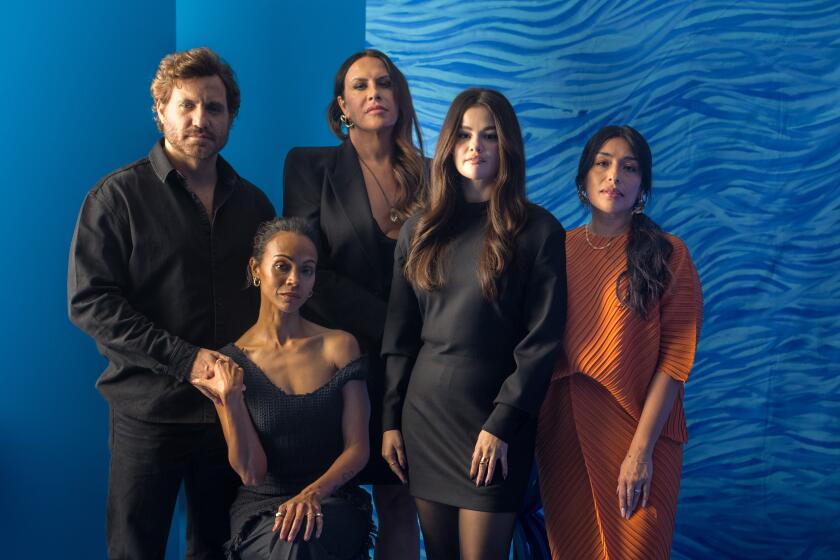Review: Questions of self and manhood run deep in remarkable South African drama ‘The Wound’
A longstanding manhood ritual reveals some sobering, unintended truths in the South African drama “The Wound” from director John Trengove. Issues of sexuality, generational divide, class and self-loathing are cross-stitched into a compelling patchwork of edgy masculinity in this tale of a gay Xhosa navigating a traditionally heteronormative rite of passage away from society’s gaze. Movies as diverse as “Brokeback Mountain” and “Moonlight” may cross your mind as you watch, but the psychic and physical scars examined here are all this movie’s own.
Every year, in an initiation called ulwaluko that takes place in makeshift camps in the Eastern Cape bush, Xhosa teenage boys from cities and townships meet their elders to be ritually circumcised without anesthesia. For weeks, the boys are nursed by “caregivers” — graduates of the ceremony themselves, now acting as mentors — and groomed to take on the socially accepted responsibilities of adult men, namely commanding respect, getting property and starting a family with a wife. Typically seen as a taboo rite, Nelson Mandela notoriously made open his experience with ulwaluko in his autobiography, calling it an education in “bravery and stoicism.”
And yet, “The Wound” asks, what if your sense of self doesn’t conform to this view of becoming a man? When Xolani (Nakhane Touré), a quiet warehouse employee, is called to the mountains to help oversee a new round of initiates, he’s assigned Kwanda (Niza Jay Ncoyini), a pampered, Westernized kid from Johannesburg whom his father believes is “too soft” and needs toughening. Xolani’s reasons for returning to the hills have less to do with upholding a male-only tradition than with eagerly reigniting a love affair with fellow caregiver Vija (Bongile Mantsai), who has a wife and child back home.
Kwanda may not fit in easily with the rowdier, poorer initiates who taunt him regularly about his expensive sneakers and snobbish air, but that doesn’t mean he’s not fully aware of the world around him. Quickly picking up on the relationship between Xolani and Vija, this unapologetically gay teenager sees an opportunity to disrupt things, turning the tables on the ritual’s power structure by provoking Xolani and Vija into coming to grips with the psychological consequences of their secrecy. If the closeted Xolani and Vija have been through ulwaluko and can’t fess up to who they are, the movie wonders, does Kwanda’s comfort in his own skin make the ritual’s traditions, and controversial connections with fostering hyper-macho intolerance, untenable?
The answer isn’t easy, even if the screenplay — by Trengove, Malusi Bengu, and Thando Mgqolozana, whose novel about ulwaluko served as inspiration — takes the tension level into mildly predictable morality thriller territory. But Trengove’s direction keeps things firmly grounded in the play of glances and intimacies under shelter of nature’s seclusion — dusk-lit silhouettes stealing moments, a waterfall rendezvous. The many exchanges between the story’s three main characters, whether silent or spoken, communicate more about the many layers of masculinity than any of the ego-boosting mantras chanted by face-painted youth in firelight just to please a bunch of old men. (Trengove is white, but his heavily researched, immersive movie never feels anthropologically dilettantish.)
The cast is remarkable too, with Touré’s quiet intensity like a flame in fear of being extinguished, while Mantsai’s textured portrayal of a closeted man with a protective coating of alpha bullying creates a through line of emotional suspense. As Kwanda, watchful and wise beyond his years, Ncoyini creates plenty of sparks with his defensive arrogance. Coming into the ulwaluko ceremony, he may think he knows who he is, but he’ll also learn that for certain men, the need for self-preservation cuts deeper than any knife in an ancient ritual.
-------------
‘The Wound’
In Xhosa, Afrikaans and English with English subtitles
Not rated
Running time: 1 hour, 28 minutes
Playing: Laemmle Monica Film Center, Santa Monica
See the most-read stories in Entertainment this hour »
Movie Trailers
More to Read
Only good movies
Get the Indie Focus newsletter, Mark Olsen's weekly guide to the world of cinema.
You may occasionally receive promotional content from the Los Angeles Times.










